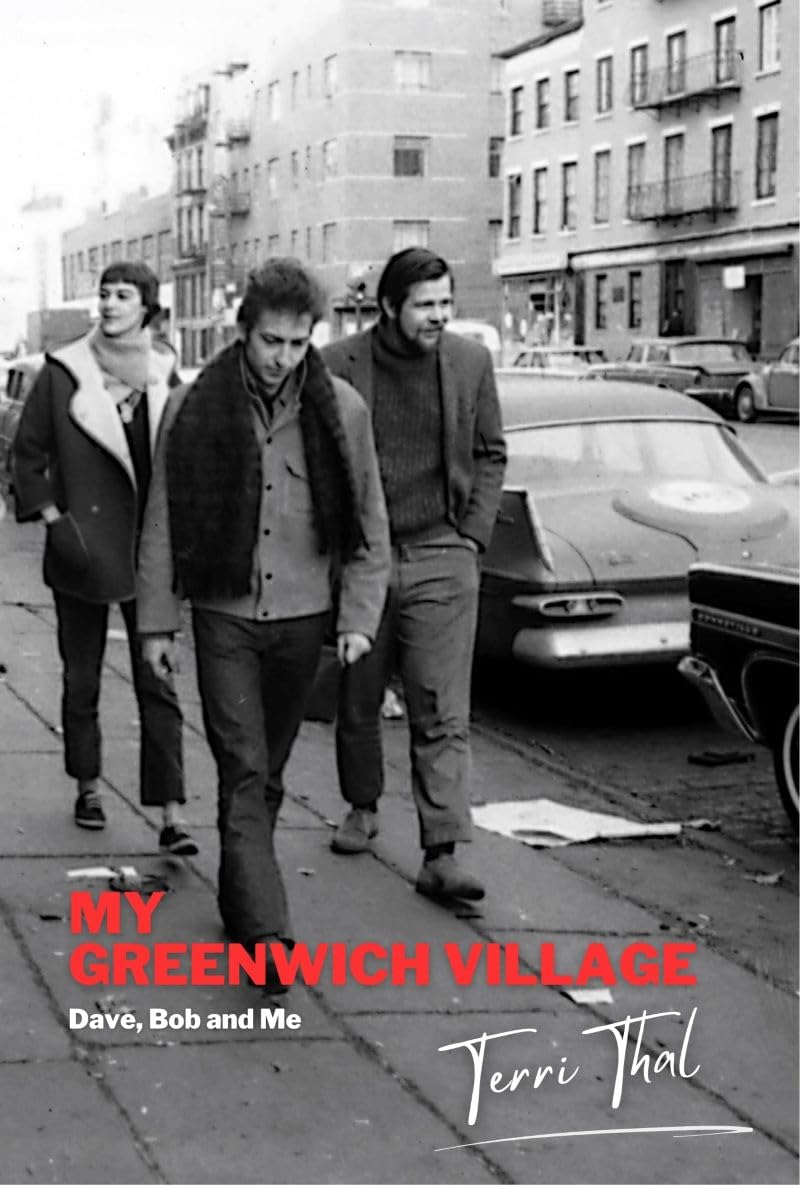I remember my first meeting with Terri Thal. She was preparing for the publication of her new book. She had titled it, MY GREENWICH VILLAGE, Dave, Bob and Me It’s release coincided roughly with the movie about Bob Dylan’s Life, A Complete Unknown. The movie was three hours long and ,yes, Timothée Chalamet did all the playing and singing himself. I asked. But if you’ve got three hours to spend, I’d just buy Terri’s book. If you go to a movie that’s 3 hours long, chances are you won’t be able to stand up afterwards and people look at you funny if you keep sitting in your chair.
Terri and I had not met previously but were both very interested in the prime days of folk music. Terri Thal was very much a part of the folk music world in 1960s Greenwich Village, New York. Few people know that she was 21-year-old Bob Dylan’s first manager prior to his contract with Albert Grossman and Columbia Records. She also managed musician Dave Van Ronk (who later became her husband), and others to include the Roche sisters, Paul Geremia and The Holy Modal Rounders. She booked performances at coffee houses, clubs and basket houses. On 6 September 1961, she recorded a set from a young Bob at The Gaslight Café – a celebrated performance as it is one his first known live recordings, and the first known live recording to feature original songs. This concert became known to Dylan fans as the First Gaslight Tape! Terri took this ‘audition’ tape to clubs and concert producers, trying to get him gigs – and she still owns the original reel-to-reel tape! She had many friends in Greenwich Village including Suze Rotolo and a number of seminal 1960s folk musicians. Even if you don’t know the singers she speaks of so warmly, a listener can’t help feeling the magic of those days.
The book is a personal story of the world of folk music in 1960s New York written by a Jewish woman from Brooklyn who, although not a musician, was an intrinsic part of this scene. Terri describes Greenwich Village as a community that was supportive, musically exciting and one in which people had fun.
Terri tells us in her book what it was like to hang out in the Village coffee houses, to host folk singers like Tom Paxton and Phil Ochs who hung out at her apartment, and to be a manager. We hear her view and involvement of the 1960s socialist organizations, and how she later merged her professional work in not- for-profit agencies. At the time her book came out, a columnist described Terri Thal as a woman who cares about two things, folk music and social justice issues.
 When i met Terri last week to prepare for the interview, she was in that new, questioning mood. She wanted, she said, to decide what there was for a woman past 50 to look forward to, in a world skewed away from women. Writer Robert Tompkins
When i met Terri last week to prepare for the interview, she was in that new, questioning mood. She wanted, she said, to decide what there was for a woman past 50 to look forward to, in a world skewed away from women. Writer Robert Tompkins joined our group revealed that he has begun to learn to play the mouth organ because he has found that when he has a tough to solve problem. doing something different often helps, and sure enough, in no time at all, ideas were flying – and so we decided that we’d meet again in two months with some brand new ideas.
Be sure to join us, and if you have some ideas you’d let us to cast a bit of light on. She didn’t want to do another book that required the research Dave, Bob, and Me had required. And she wanted to make a difference in the world.. If you’ve listened to the podcast recorded here , were very excited about helping Terri in her search begins with a quote from Terri’s book. Chapter 1 (“Where I Came From”) begins with a quote she attributes to John Wynn: “‘you were the first woman we knew who had balls’” (1). Wynn’s comments were, as Thal tells us, a testament to her singularity in the 50s and 60s folk scene: she was not an “object” as so many women were, “but a participant in a world of music, excitement, political passion, and fun.”
This is a testament to an undoubtedly forceful personality and unrepentant individualism, but her story, which culminates with her arrival on the folk scene, is also a testament to the ways the strictures of patriarchy mitigate or partly subvert agency. In almost the same breath as her initial introduction, she explains that after meeting Van Ronk, she struggled to carve out her independence, having invested her “personal self into Dave’s career.” This was a core problem that, it would seem, she never completely overcame. Although she was at times the breadwinner, Thal’s career trajectory was initially tied to him – she got her start as his manager before she went on to manage other folk acts. Moreover, Van Ronk appears at various points as her protector. In a sexist village scene, it was helpful to have Van Ronk’s “tacit assumption that I should be included anywhere I wanted to be.”
So we invite you to join in the ideas and be sure to listen to our December podcast and let us know if you have any ideas. We’ll see that Terri gets them. Let us know if you need ideas too. We’ll keep you posted.
